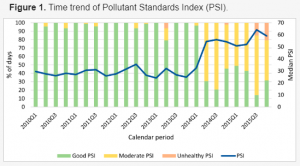Singapore—A study conducted by various healthcare professionals showed a significant link between worsening haze conditions in Singapore and increasing mortality rates from 2010 to 2015.
Proponents of the study include medical and health experts from SingHealth, Duke-NUS Medical School, the Health Promotion Board, Singapore University of Technology and Design, Singapore General Hospital, National University Health System and Tan Tock Seng Hospital.
The study titled “The Relationship Between Air Pollution and All-Cause Mortality in Singapore” found that there was indeed a correlation between air pollution and mortality rates in the country.
The unhealthy Pollutant Standard Index (PSI) readings caused by the trans-boundary haze also led to increased upper and lower respiratory tract infection and inflammation, allergic reactions and affected patients with existing cancer and heart disease.


The researchers previously found that exposure to unhealthy PSI ranges is also linked to an “elevated risk” for stroke and heart attacks.
PSI is a primary standard for measuring air quality. Moderate PSI range falls under 51 to 100. Unhealthy PSI readings range between 101 to 200.
“Air pollution is a tremendous public health issue, and our study has incorporated the Singapore context into the existing and growing body of evidence on the effect of air pollution on health,” the researchers concluded.
The study was published in the open-access academic journal Atmosphere and is available online./TISG
Haze prompts healthcare institutions to initiate diversified approaches to safeguard people

